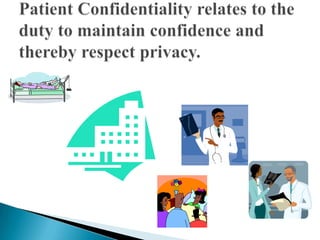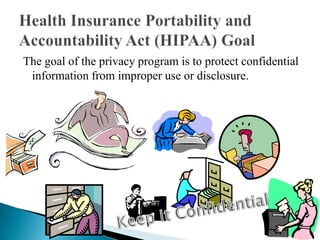Jackson confidentiality mha690 health care capstone week 1 discussion 2 medical ethics in healthcare confidentiality
- 1. Maintaining Patient Confidentiality A in-depth study of training methods to reduce and avoid breaches in patient information Rennessa Jackson MHA690 Health Care Capstone Instructor Grover April 3, 2013
- 2. The new medical ethics training the manager will introduce will include: engaging in a philosophic discussion of the many troubling issues in medicine dealing with confidentiality, privacy, and security of computerized (and paper-based) clinical and administrative health data. offer a medical ethics lecture series which is open to all clinic personnel and the office staff. offer medical ethics supports in ethics in the main clinic library of the Healthcare Center that contains books, journals and videotapes of its ethics lectures. offer continuing education training that will include medical ethics to all medical personnel to be done periodically through the year to refresh the information learned.
- 4. It is everyone within the Healthcare system’s responsibility to maintain patient privacy.
- 5. Health employees, especially those who are asked to manage such sensitive data as patient records, must have the ethical responsibility and wisdom to uphold the laws that protect the appropriate and authorized usage, access, and exchange of patient information within our dynamic, innovative technological environment.
- 6. The confidentiality, privacy, and security of computerized (and paper- based) clinical and administrative health data are of major concern to all healthcare personnel and staff. Again, it is everyone’s responsibility.
- 7. The health care provider has a duty to the patient to protect their information. “while not everyone will act alike, all healthcare providers are obligated to make decisions within a basic ethical framework built on compassion and respect for human dignity, commitment to professional competence, spirit of service, honesty, confidentiality, good stewardship, and careful administration.” Provider Duty Protection of patient information
- 8. These laws/regulations has such a great impact on patient privacy standards in the healthcare industry because of the need for all health care providers to have the patient's consent in order to be able to access their medical records or related information. All records must be kept safe in locked cabinets and closets. This is both an ethical and legal obligation to the patient.
- 9. The goal of the privacy program is to protect confidential information from improper use or disclosure.
- 10. In order for this training program to be successful with the employees. The Manager has to outline their responsibility within the program. • You must respect confidential information about patients and use information only to perform your role as hospital personnel. • It is your responsibility to be sure patient information is only given or disclosed to others who have a legal right to it. What information needs to be kept private? All information that identifies an individual is considered confidential. This includes, but is not limited to name, address, date of birth, phone/fax numbers, and photographs. It also includes nursing and physician notes, as well as billing and other treatment records used during a patient's visit in a hospital or office.
- 11. Hillestad, S. & Berkowitz, E. (2004). Heath care market strategy: From planning to action (3rd ed). Sudbury, MA: Jones and Bartlett. Wolper, L.F. (2011). Health care administration: Managing organized delivery systems (5th ed.). Boston: Jones and Bartlett. Johnson, J. (2009). Health organizations: Theories, behavior, and development. Boston: Jones and Bartlett. Timeline:What’s Changing and When. HealthCare.govTake health care into your own hands. Retrieved 01/17/2013 from http://www.healthcare.gov/law/timeline/










